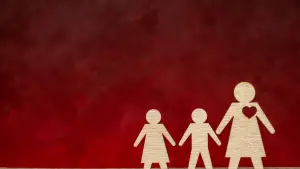Every year on June 1st, countries around the world come together to celebrate International Children’s Day, a special occasion dedicated to recognizing and promoting the well-being, rights, and happiness of children. This global observance highlights the importance of nurturing and protecting children, ensuring their rights are upheld, and providing them with the opportunities they need to thrive. In this blog post, we will delve into the history of International Children’s Day and explore its significance for Nigeria, shedding light on the efforts made to improve the lives of Nigerian children.

The History of International Children’s Day
The concept of International Children’s Day can be traced back to the early 20th century when numerous child welfare organizations and social reformers worldwide recognized the need for a dedicated day to address the challenges faced by children. The welfare of children became a global concern, particularly after the devastating consequences of World War I. The suffering and loss experienced during the war brought attention to the vulnerability and rights of children, prompting advocates to take action.
The first official International Children’s Day was established in 1925 during the World Conference for the Well-being of Children held in Geneva, Switzerland. Representatives from different countries agreed to designate a universal day to promote children’s rights and welfare. June 1st was chosen to honor the memory of the countless children who had suffered during the war and to emphasize the importance of protecting the rights of all children regardless of nationality, ethnicity, or socio-economic background.
International Children’s Day aims to create awareness about the unique needs, challenges, and potential of children worldwide, fostering a collective responsibility to ensure their well-being and development.
International Children’s Day in Nigeria
Nigeria, as a vibrant and diverse country in West Africa, embraces the spirit of International Children’s Day and recognizes the importance of empowering its young population. This day holds great significance for Nigeria, given its vast youth population and the challenges they face. By celebrating International Children’s Day, Nigeria reaffirms its commitment to promoting the rights, education, and overall well-being of its children.
Nigerian children encounter various obstacles that hinder their development, such as poverty, inadequate healthcare, limited access to education, and the persistence of child labor. However, the government, non-governmental organizations (NGOs), and individuals across the country are actively working to address these issues and improve the lives of Nigerian children.
International Children’s Day in Nigeria serves as a platform to raise awareness about the specific challenges faced by Nigerian children and to advocate for their rights. It encourages policymakers, community leaders, and individuals to take action and invest in programs and initiatives that enhance children’s lives. These efforts encompass a range of areas, including education, healthcare, child protection, and social welfare.
Celebrating International Children’s Day in Nigeria
For example, on International Children’s Day, educational institutions, community centers, and NGOs in Nigeria organize various events and activities aimed at promoting children’s rights and providing them with a joyful experience. Schools often hold awareness campaigns, educational workshops, and cultural programs that emphasize the importance of education, equal opportunities, and the right to play and enjoy childhood.
Furthermore, governmental bodies and NGOs collaborate to ensure access to quality healthcare and nutrition for children. Free medical check-ups, immunization drives, and health education programs are organized to address the health challenges faced by Nigerian children, including preventable diseases, malnutrition, and inadequate access to healthcare facilities.
International Children’s Day also serves as a platform to address issues related to child labor and child trafficking in Nigeria. Awareness campaigns, workshops, and seminars are conducted to educate communities about the negative impact of child labor and the importance of protecting children from exploitation. Such efforts contribute to strengthening child protection laws, promote social welfare programs, and empowering children to realize their potential and contribute positively to society.
Final Thoughts
International Children’s Day is a beacon of hope, reminding us of the significance of nurturing and protecting the world’s youngest members. As we reflect on the history and importance of this global observance, we recognize the profound impact it has on Nigeria and its commitment to the well-being and development of its children.
In Nigeria, International Children’s Day serves as a powerful platform for advocacy, awareness, and action. It brings together government entities, NGOs, educational institutions, and communities to address the challenges faced by Nigerian children and to work towards ensuring their rights are upheld. By investing in education, healthcare, child protection, and social welfare initiatives, Nigeria is actively empowering its children, nurturing their potential, and securing a brighter future for the nation.
However, the journey towards securing the rights and well-being of all Nigerian children is ongoing. It requires sustained efforts from all stakeholders, including the government, civil society organizations, families, and individuals. By prioritizing children’s rights, investing in their education, providing access to quality healthcare, eradicating child labor, and protecting them from exploitation, Nigeria can create an environment where children can flourish and contribute to the country’s development.
As we celebrate International Children’s Day, let us embrace the spirit of compassion, empathy, and responsibility towards our children. By nurturing, protecting, and investing in them, we ensure that every child in Nigeria and around the world has the opportunity to grow, learn, and thrive. Together, we can build a society where every child’s rights are respected, their voices are heard, and their dreams are realized.
Frequently Asked Questions about International Children’s Day
What is International Children’s Day?
International Children’s Day is a global observance dedicated to promoting the well-being and rights of children. It is celebrated annually to highlight issues affecting children and to advocate for their welfare.
When is International Children’s Day celebrated?
International Children’s Day is celebrated on various dates around the world. In many countries, it is observed on June 1st, while others may have different dates, often coinciding with national holidays or historical events.
What is the significance of International Children’s Day?
The day holds significance as it raises awareness about children’s rights, advocates for their protection, and emphasizes the importance of education, health, and overall well-being for children globally.
How is International Children’s Day celebrated?
Celebrations vary worldwide and may include educational events, cultural activities, community gatherings, and initiatives aimed at addressing children’s needs. Schools, NGOs, and government organizations often organize events to mark the day.
What are some common themes for International Children’s Day celebrations?
Common themes include promoting education, ensuring child health and nutrition, preventing child labor, advocating for children’s rights, and addressing issues such as child abuse, discrimination, and poverty.
Are there specific global organizations involved in International Children’s Day activities?
International Children’s Day is supported by various global organizations, including UNICEF (United Nations International Children’s Emergency Fund) and Save the Children. These organizations work to improve the lives of children and support initiatives that promote child well-being.
How can individuals participate in International Children’s Day?
Individuals can participate by supporting local events, volunteering for child-focused organizations, raising awareness about children’s rights, and contributing to initiatives that improve the lives of children in need.
Are there educational aspects to International Children’s Day celebrations?
Yes, many International Children’s Day events include educational components, such as workshops, seminars, and awareness campaigns aimed at informing communities about children’s rights, health, and the importance of providing a safe and nurturing environment for children.





